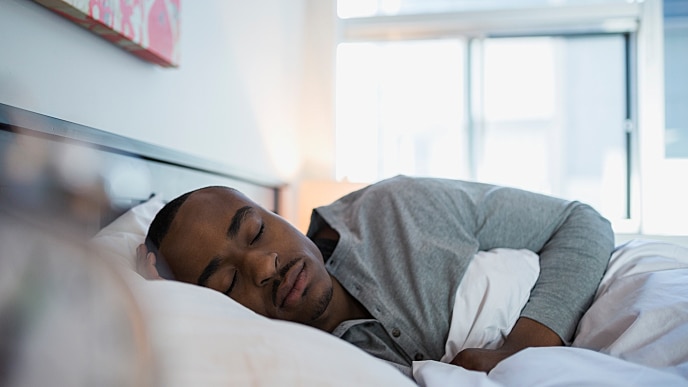-
-

BRUSHING & FLOSSING
How to BrushWhat Is the Right Way to Brush?
Proper brushing takes at least two minutes — that's right, 120 seconds!...

BRUSHING & FLOSSING
How To FlossWhat is the Right Way to Floss?
Proper flossing removes plaque and food particles in places where a toothbrush cannot easily reach... -
Science & Innovation
- Home
- Oral Health
- Teeth Grinding: How to Stop Grinding Your Teeth at Night!


Do you ever wake up from a night's sleep with sore teeth and jaws? Did you know that you could be grinding your teeth? Grinding your teeth is also known as bruxism and is a rhythmic clenching of the jaws and grinding of the teeth; the behaviour may develop at any age. Teeth grinding is usually done unconsciously in your sleep, but it can also occur when you are awake. During the day, a person who is concentrating on a task will often place his or her teeth together and apply force through a contraction of the jaw muscles. This is commonly associated with the daytime tasks of lifting heavy objects, driving, reading and writing. During sleep, it presents as clenching and rhythmic contractions.
Teeth-grinding symptoms
The most common symptom of teeth grinding is a headache. According to the Australian Dental Association, other symptoms include sore jaws, fractured, chipped or loose teeth, sensitivity to hot and cold food and drinks, stiffness in the face and temples and ear pain. The teeth are adversely affected and may show abnormal wear and mobility, and the behaviour may lead to the fracture and loss of teeth.
Treatment for teeth grinding
How can you stop clenching or grinding your teeth? It depends on the contributing factors. Is it due to a sleep disorder, lifestyle factors or stress and anxiety? It is important to have your dentist evaluate you with a comprehensive exam and develop a treatment plan that is specialised for you.
The best way to protect your teeth and prevent tooth wear and fracture is to wear an occlusal appliance. These appliances have different names, including occlusal splints, occlusal bite guards, night guards, bite plates and bruxism appliances. These are custom-made, specially fitted plastic mouth pieces that fit over your top or bottom teeth. Wearing one of these appliances will reduce jaw muscle pain and protect both your teeth and temporomandibular joint. The appliances are usually worn at bedtime and are considered the treatment of choice.
Other treatment options: mandibular advancement devices
Other appliances may be used, like mandibular advancement devices. These are custom-made, specially fitted appliances and usually fit over your top and bottom teeth. Mandibular advancement devices typically bring your bottom jaw (mandible) forward. These devices are used when a sleep disorder is a probable cause of grinding. The device is also used to help manage snoring and sleep apnoea. When grinding your teeth is caused by sleep apnoea, this is the preferred treatment.
If anxiety or stress is believed to be the cause of teeth grinding, then behavioural management is a must. Relaxation techniques, meditation and psychoanalysis can help manage the stress and anxiety. Hypnosis has also been found to help relieve grinding of your teeth. Sometimes a combination of behaviour modification and occlusal appliances is required.
Your next steps
Putting an end to the clenching or grinding of your teeth requires an evaluation by your dentist or by an oral and maxillofacial surgeon. After an exam, a treatment plan can be implemented. It may include an occlusal appliance and, possibly, behavioural modification methods. This will help to prevent the teeth grinding behaviour and make you feel comfortable when you wake up from a good night's sleep.
This article is intended to promote understanding of and knowledge about general oral health topics. It is not intended to be a substitute for professional advice, diagnosis or treatment. Always seek the advice of your dentist or other qualified healthcare provider with any questions you may have regarding a medical condition or treatment.
Related Products

Helping dental professionals
More professionals across the world trust Colgate. Find resources, products, and information to give your patients a healthier future











